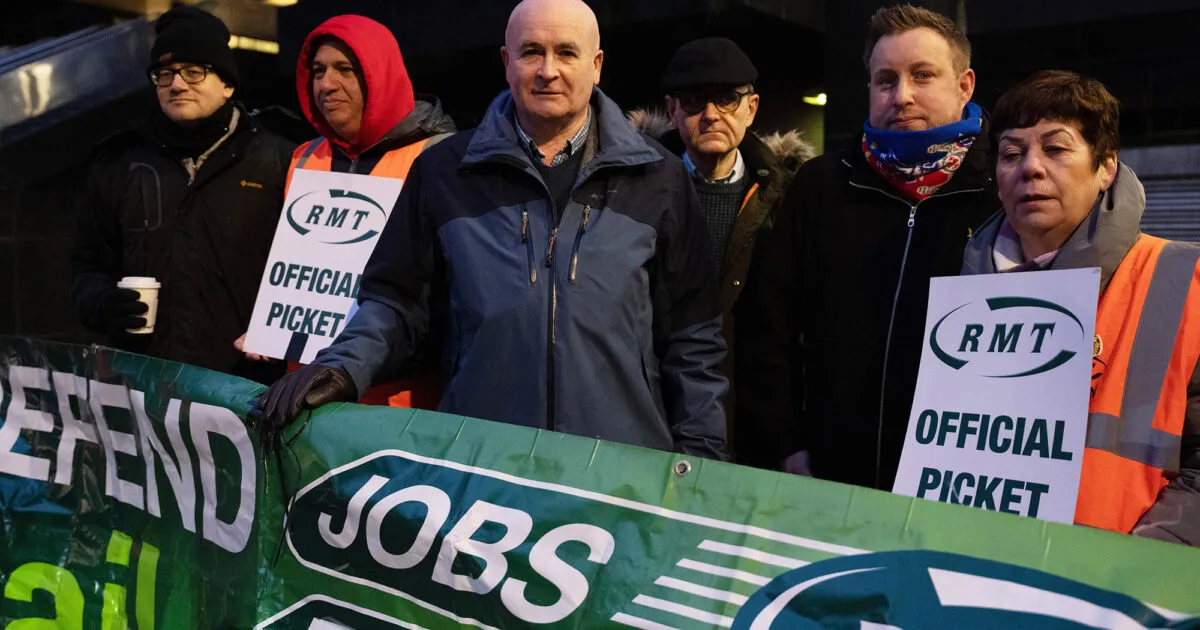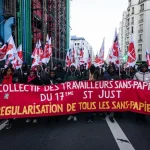Paris, France – In the early hours of October 17, 2023, Moussa*, an undocumented construction worker, participated in a wildcat strike at the construction site of a major arena in Paris. His hope was that this protest would finally lead to the necessary documentation allowing him to return home to Mali.
Since arriving in France in 2019 after a perilous journey from Algeria to Spain, Moussa, now 25, has not had the chance to take a single vacation. The loss of his grandparents during his time abroad has intensified his desire to reunite with his family and grieve together.
For eight months, he worked tirelessly at the arena, which is set to host events for the upcoming 2024 Summer Olympics. The site employed over 400 construction workers, all striving to meet the demands of this high-profile project.
To navigate his undocumented status, Moussa used another person’s identification to receive regular pay slips. He earned approximately 75 euros ($85) daily for grueling 10-hour shifts, a wage that did not cover transportation costs or necessary safety equipment.
His efforts bore fruit when the workers staged a pre-dawn occupation of the site, effectively halting operations and engaging in negotiations throughout the day. By evening, they reached an agreement.

Following extensive discussions involving Moussa’s employer, the city of Paris, the workers, and their union, a list of 14 undocumented workers was submitted to the French police prefecture for processing their visa applications. This agreement included provisions for residency permits and health insurance, signed by the city and the construction company.
However, 18 months later, the promised documentation remains unapproved, with only one worker receiving an appointment at the prefecture.
Many of the undocumented workers are beginning to suspect that the delays are intentional. “We only asked for a residency permit and health insurance, which is our right. Yet, we still lack the legal ability to work in this country,” Moussa expressed.
Three of the 14 workers, along with Rafika Rahmani, a lawyer for the union advocating for expatriate rights, revealed that they submitted all required documentation over a year ago. “We have payslips and everything needed. We are following the rules, yet we have not received a single summons,” said Adama*, one of the workers. “We are left in the dark about the prolonged processing of our files, having resubmitted them twice already.
“Living without proper documentation feels like being imprisoned in France,” Adama lamented, sharing his struggles to find adequate housing. He currently shares a room with 11 others in Montreuil. “In this country, lacking papers means you are treated as if you have no worth.” Despite these hardships, Adama is committed to improving his situation and attends evening French classes.
‘A Form of Retribution’
In January 2025, the union representing construction and cleaning workers resubmitted 13 applications to the Paris prefecture. Rahmani noted, “Despite my efforts to reapply for these individuals, their files remain stagnant.” She suspects that the lack of progress is a form of retribution for the strikes that highlighted poor working conditions leading up to the Olympics.
“This is revenge,” Rahmani stated. “The striking workers have tarnished France’s image, even if it reflects the reality of their situation.” Allegations have surfaced that project developers and subcontractors have barred some workers from returning to their jobs, resulting in job loss and housing instability.
According to Adama, at least three of his colleagues have been unemployed since the strike in October 2023, relying on charitable organizations for food and shelter. “We have evidence that the company has not reinstated them, viewing it as a disciplinary action for their participation in the strike,” said Jean-Francois Coulomme, a representative from a left-wing political party. “This is a deliberate strategy to ostracize these workers.”
In February, Coulomme reached out to the interior minister regarding the status of the submitted applications, demanding the rightful regularization of these workers. However, his letter has gone unanswered.
“The situation of the arena workers exemplifies a broader systemic issue, illustrating how these individuals are silenced due to their precarious legal status,” Coulomme remarked.
The union and the Gilets Noirs, a collective advocating for the rights of undocumented migrants, have sought to expedite the process through the city of Paris, which was involved in the negotiations. “We have made some progress by engaging with the mayor’s office, acting as a liaison with the prefecture. However, the situation remains somewhat stagnant at the prefecture level,” Doums, a spokesperson for the Gilets Noirs, explained.
Coulomme suggested that the Ministry of the Interior is obstructing the approval of these applications. “The prefectures operate under the directives of the ministry, which influences their decisions,” he stated.
Attempts to negotiate swiftly in response to scrutiny before major international events are common, yet follow-through often dissipates once the attention fades.
“The exceptional circumstances surrounding the Olympics can be leveraged to secure workers’ rights,” said Jules Boykoff, a researcher and author. “The challenge lies in ensuring that these gains are solidified while the Olympic spotlight is still shining. After that, it becomes increasingly difficult to hold onto those promises.”
While the Olympics can provide a platform for advocating for rights, they also create opportunities for exploitation, particularly for vulnerable groups like undocumented workers.
“This situation exemplifies the exploitation of individuals to create an event that claims to benefit the masses but ultimately serves the interests of a select few,” Boykoff remarked. “The Olympics often highlight the plight of marginalized populations, whether they are athletes or workers who contribute to the spectacle.”
Rahmani added, “During the strike, numerous officials made grand promises. They attended demonstrations, pledging to regularize these workers, yet there has been no follow-up, and they claim to lack the authority to act.”
‘A National Ideology at Play’

In recent years, the French government has adopted a stricter stance on immigration. In December 2023, a controversial immigration law was passed, distinguishing between employed foreigners and those who are not, making it more challenging for unemployed expatriates to access social benefits.
These new regulations have had tangible effects in workplaces. Between 2023 and 2024, official statistics indicate a 10 percent decrease in the regularization of undocumented workers, while deportations surged by over 25 percent.
“This ideology is impacting our nation as a whole, as the migration issue is being manipulated for utilitarian purposes,” Coulomme stated.
On the ground, Doums noted that the Gilets Noirs have observed similar trends. “The political climate regarding immigrants and foreigners is becoming increasingly complex,” he said. Nevertheless, he affirmed that the collective will continue to advocate for their rights. “We will not cease our efforts. Even after regularizing the 14 individuals, our fight will persist.”
A general view of the arena, which is set to host various events for the upcoming Olympics, reflects the ongoing struggles faced by those who helped build it. The promises made during the lead-up to the games remain unfulfilled, leaving many workers in a state of uncertainty.

